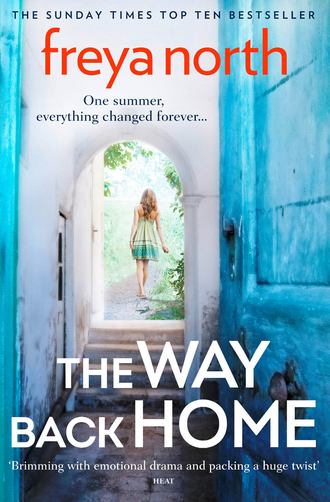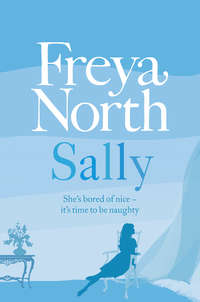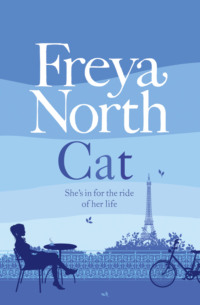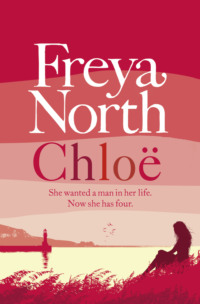
Полная версия
The Way Back Home
‘I offer financing,’ Malachy told them. And this sounded like an excellent idea because it was nought per cent and it meant that the artist had his money, Malachy had his commission and this nice couple could own their art on an affordable basis. He went to his desk to prepare the paperwork and noted the woman very close to the paintings, apparently sniffing them. He didn’t mind at all. When he’d finished the paperwork, however, he saw that she had gone. One day, he thought, one day someone will come in and buy all three. It sometimes happened like that; the unlikeliest of people suddenly turning up.
Oriana walked on and there, like an oasis in the yawing march of her memory, the small newsagent’s still stood. The only thing that had changed was that the Daily Mail now sponsored the shop sign, not the Daily Mirror, but from what Oriana had deduced since her return, this switch from left to right was par for the course nationwide. She bought water and Cadbury’s chocolate and possibly their only copy of the Guardian. The shopkeepers were new to her and had put their mark on the place with a tabletop unit containing exotic-looking pasties as well as a vending machine for coffee, tea and hot chocolate. Coffee. Coffee was a good idea. Even if it wasn’t good coffee, she suddenly craved something caffeinated and hot.
Slowly she walked, so as not to spill her drink and to give herself the chance to look up and around. Blenthrop, she was back in Blenthrop and it was no big deal. The town didn’t know her and the town was welcoming. With her coffee finished, she sent Cat a text, hoping to call in on her way back to Hathersage. Oriana decided to have one last look around the gallery before making tracks. The gallery, though, appeared to be empty, closed even. But Oriana thought I wonder if those people bought that sculpture? And it became a really provocative thought. How much was it? Who is the artist? But did they buy it? Just as she’d bought a paper and some chocolate and a coffee – had they come out on a Saturday and bought some art? She had to know. She tried the door and it opened.
In she went, her nose now finely tuned to the oily fragrance emanating from the landscapes. The gallery was Tardis-like; it was deceptively large and went back some way. She walked quickly over to the sculpture. A little red sticker – they did buy it! She felt peculiarly vindicated. It didn’t have a price on it but the artist was called Yuki McDonald. McDonald. Maybe the form was inspired by a slippery otter playing mercurially on a Scottish loch, or salmon leaping at Pitlochry. Yuki. Perhaps the form was linked with something more symbolic from Asia – a crane or some more mythical form. She went back to the landscapes and sensed the paintings draw her in, the same sensation the dales themselves had whenever she went there – they were to Oriana as the moors were to Cathy.
I wonder how much these paintings are?
They didn’t have a price. She turned to the opposite wall, wondering if anything here had a price. And, like a smack in the mouth and a blow to the heart, two of her father’s works glowered at her. She crept towards them. Robin Taylor, Depth I. Robin Taylor, Depth IV. Ink and mixed media on plasterboard. Her father once told her the women he painted were imagined, that his pictures weren’t portraits, they were impressions. But these women were staring at her as if they knew her, as if it was down to her to acknowledge their pain, take it on and free them. Just then, to Oriana, the White Peak Art Space became very dark indeed and she turned to leave.
Damn – I might have missed a sale.
Malachy had just come through from the back with a steaming mug of tea and a biscuit when Oriana reached the door.
‘Hullo – can I be of any help?’
Usually, people automatically say no thanks, just looking, to which Malachy always says it’s a gallery – feel free, which then leads on to varied and mostly interesting discussion about what they see when they look at art.
Just now, though, his offer garnered no response. Could be a foreign tourist though it was still early in the season. He put the mug down, took a quick bite of biscuit, wiped the crumbs on the back of his trousers and looked over towards the door where the woman had turned to stone. The tilt of her head, the whole of her. In an instant he knew who it was. Suddenly, he could no more speak than Oriana could move. The postman came in and stared at her as if she was some kooky installation. He stared at Malachy too, who was unable to take the bundle of post he was being handed.
‘Well, see you next week then, Malachy.’
‘Malachy as in key,’ Oriana said quietly, turning.
The postman had pronounced his name Malachy as in sky.
For the first time in eighteen years, Oriana and Malachy faced each other head on.
It’s OK, she said to herself. It’s OK. Don’t stare.
You need to look, she told herself, to see. Otherwise it’s rude – and ignoring it makes it more of an issue.
But don’t stare.
She noted how his hair was now delicately silvered here and there but still licked into the haphazard curls she’d never forgotten. As he approached, she caught his violet-grey eye colour striated like local Blue John. Sharp cheekbones and slim nose which always suggested an aloofness far from true.
And she had to acknowledge, for the first time, the eyepatch – a softened triangle of black protecting, concealing, his left eye; corded neatly around his head.
‘You have a beard, Malachy.’
He felt his face thoughtfully. ‘I couldn’t be arsed to shave last week,’ he said. ‘But you, Oriana – you haven’t changed a bit.’
CHAPTER EIGHT
‘You were sniffing Natalie Fox.’
‘There isn’t a sign saying “No Sniffing”.’
‘Oils should be sniffed, sculptures touched.’
‘Is this your gallery?’
‘Yes.’
‘You own it? It’s your career?’
‘Yes. You look – disappointed?’
‘It’s – it’s impressive. Congrats. But – what about being an author?’
‘A teenage daydream. But I still write. Still writing that novel.’
Silence. You don’t have to stare – but it’s a bit obvious you’re looking everywhere but at Malachy.
‘Is it?’ Oriana touched her own eye, as gently as if she was touching Malachy.
He shrugged. ‘It was a long time ago,’ he said softly.
‘But –’ Oriana wasn’t sure what she wanted to hear. She didn’t know whether Malachy would rather not talk about it. She was unsure whether it was impertinent for her, of all people, to ask. She hadn’t seen him for such a long time. And here he was, here was Malachy, changed and yet unchanged.
‘I lost it,’ he said in the same gentle tone. ‘My eye, my sight.’ He watched how she nodded but couldn’t look at him.
‘Sixty per cent of injured eyes become phthisical and require either evisceration or enucleation,’ he continued quickly, as if medical facts made it less personal, as if being in the majority made it somehow less severe.
‘I – I don’t know what those words mean,’ she struggled, staring hard at the floor.
‘Sorry,’ he said. ‘Sorry.’
And Oriana thought how ridiculous it was that the word should come from Malachy. The constriction in her throat made it impossible for her to say so.
‘The terms, the minutiae,’ Malachy qualified, ‘they’re just part of my lexicon – I forget.’
Oriana glanced at him, then away, then to the door. Suddenly, Malachy really didn’t want her to go, not yet, not now she was back after such a very long time.
‘Beyond twenty feet, everyone sees the world as if they have only one eye,’ he said. He lifted her wrist and placed her hand over her eye. Pointing for her to look at the back of the gallery, he lifted her hand off, then on. He needed to change the subject, draw her back from the past to right here, in his gallery. An extraordinary thing that they should be marvelling about. ‘You’re back – from the States.’ It was a fact, not a question.
‘Yes.’
‘How long for?’
‘I’m back for good.’
Just then, to Oriana, the word seemed preposterous. Life on both sides of the Atlantic suddenly seemed ridiculously complicated. Where could she run to next? Australia?
‘Or for the time being,’ she added.
‘And are you in the area – for the time being?’
She nodded. ‘Hathersage.’
‘At your mother’s?’ He couldn’t contain his surprise and it made her giggle. He had her gaze once again.
She rolled her eyes at herself and shrugged. Pathetic really. Thirty-four years old and living with her mother.
‘And are you OK, Oriana? Are you all right?’
He always knew. He always knew when she wasn’t.
Malachy watched as she hauled herself to her tallest and pulled the widest smile possible across her face.
‘Oh, I’m good,’ she said, with drama and drawl to her inflection.
And then the gallery phone rang. And an elderly couple came in. Followed by a father and a teenage boy. And Malachy thought this is very, very bad timing. All of it. He knew that as soon as he turned away from her, returned to the demands of his day, Oriana would disappear. In the blink of an eye, she’d be gone. That’s what had happened all those years ago. Now you see her, now you don’t.
CHAPTER NINE
‘You look like you’ve seen a ghost!’ Jed laughed at Malachy when he arrived at the gallery just before closing. ‘Sorry – I know I said lunch-time. The day ran away with me.’
His brother was just staring at him.
‘I bought food though,’ Jed said. ‘Including ground coffee.’
‘I just saw Oriana.’
Malachy watched the colour drain from Jed’s face while redness crept up his throat.
‘Oriana?’ Jed looked quickly around him. ‘Here?’
‘Here.’
‘How did she know you work here?’
‘She didn’t.’ Malachy paused. Jed was visibly flummoxed. ‘She literally showed up out of the blue,’ he told him. ‘She said she’s back from the States and living with her mother.’ Jed was speechless, staring at her father’s paintings as if they held a clue, if not an actual answer. ‘She was surprised I’m not a best-selling author. I completely forgot to ask her what she does.’
‘Did she leave a number?’
‘No.’ Malachy thought about it. ‘I wonder if Robin knows.’ He looked at Robin’s paintings too. He turned to Jed. ‘Did you pop in on him today?’
Jed hit his forehead. ‘Sorry – sorry. I didn’t. No.’
‘I’ll call in when we get back,’ said Malachy.
‘Will you tell him? About Oriana?’
Malachy thought about it. ‘No,’ he said.
‘Does he talk about her?’
‘Not really – sometimes he says her name, but in a disembodied way, as if it isn’t connected to a person, let alone his daughter. As if he just likes the taste of the word on his tongue.’
‘Did she –’ Jed wondered about this conversation, how to cut it off yet know everything before he did so. ‘Did she seem happy? Pleased to see you?’
Malachy thought about it. ‘I’d say she seemed flabbergasted.’ Then he thought about it. Terrified would have been a better word. ‘But she hadn’t changed, not really.’
‘You have,’ said Jed. ‘She hasn’t seen you since—’
‘I know,’ said Malachy. ‘I’m aware of that.’
Jed and Malachy drove back to Windward in their separate cars, privately picking over all the tiny details. From the silt of the past, undisturbed for so long, the seed bank of memories and dormant feelings was awakened. They were both acutely aware that if they talked about her, about what had happened, they’d spend the rest of the weekend doing so but getting nowhere. They also knew there was even less point pondering her return and mulling the what-ifs of her being here. Her absence had brought them closer. Her reappearance, however, could drive them apart.
Malachy parked precisely, Jed at a hasty slant across his brother’s car. His boot was crammed with shopping and they took the bags into the house. As they put the items away, they read out what each was, just as their mother used to. It gave a rhythm, a ritualization to it; a pointless family tradition that, when it was needed, carried meaning and comfort.
‘Was forty quid enough?’
‘Was it hell.’
‘I have cash.’
‘Forget about it.’
‘I’ll go and see Robin now.’
‘Do you want me to come with you?’
‘No – you’re fine, Jed.’
‘OK. Maybe I’ll swing by tomorrow. I’ll get the dinner ready – how about that?’
‘Sounds good. I won’t be long.’
Alone in the apartment, Jed sat down heavily. Why hadn’t he said, I saw her too? He could have been breezy, nonchalant even. She swung by the house! We had a quick chat! Why keep it from his brother when so much time had passed and after so much had happened? But Jed knew why. All he’d ever wanted to do was to keep Oriana all to himself.
Malachy left the apartment by the inner door connecting with the interior service corridor. He never used Robin’s front door. It would alarm him; Robin didn’t accept visitors any more. The Corridor was like a conduit between the private worlds within the apartments and the lives in the house over the decades. From staff in the eighteenth century going strictly and quickly about their business, to the scamper and larking of the children of the artists meandering and playing for hours on end nearly two hundred years later. Nowadays, though, it was the echoes of its past that rang out the most; the newer residents rarely used it.
As Malachy walked, it was impossible not to hear Oriana squealing her way along it on a tricycle, then a bike firstly with and then without stabilizers, soon enough her roller skates, and ultimately her skateboard. Malachy smiled, conjuring her up at the far end bowling for him while he waited right at the other end in full cricket whites with his bat at the ready. Out of the gloom the tennis balls came hurtling, him fending them off as if they were missiles while Oriana called, four! six! a hole in one! rounder! And, if she caught one, bull’s eye!
Teach me not to throw like a girl.
The recall so vivid it rooted him to the spot. He remembered how he’d come behind her, slipped his hand down to her wrist, tried to show her how to twist, flick. She’d tried and failed, growled at herself and stamped her feet, impatient at her ineptitude. Hurling balls here and there. It doesn’t work, Malachy – I can’t do it! I throw like a girl! And that was the first time he’d kissed her.
Malachy called through as he entered Robin’s place, though the sombre groan of the door and echoing thunk as he closed it would have announced his arrival anyway. There was nothing wrong with Robin’s hearing but it depended on which world he was in whether he actually registered it or not.
‘Hi, Robin!’
Silence.
Malachy whistled casually as he made his way from room to room. Not in the kitchen. Bathroom door open; towels on the rail, spirit-level straight. Study door closed. Malachy knocked, poked his head around. The day bed, with a tartan blanket flung back as if someone had suddenly become overheated; the swivel chair facing Malachy as if someone had only just now left it. The walls a latticework of shelves, bent and bowed with the weight of all the books and, in the spaces between the books and the next shelf, piles of papers, brochures, catalogues and magazines. The room could do with some air. And then Oriana’s room. Today, he felt he did want to see in there – but what if Robin had renovated it the way Malachy had Jed’s old room? What if nothing had changed and even the quickest glimpse hurled him back through time to a period during which he was happiest and at his most miserable? He took his hand off the knob, walked on to the sitting room and through to Robin’s studio. He was in there, at the easel behind a canvas, and Malachy could only see his legs and the legs of the stool on which he sat.
‘Hullo, Robin.’
Robin peered around the side of the canvas and stared for a moment.
‘Yes?’
‘It’s Malachy – I just thought I’d pop in.’
‘Well, fuck off.’ Robin disappeared behind the canvas, muttering.
‘I’ll go and make you some soup, shall I?’ Malachy continued. He glanced around the room. There was no sign of any meals having been taken. All the mugs that were on various surfaces were crammed with paintbrushes and palette knives, pheasant feathers, knitting needles, flat wide pencils and small branches with curled and crusted leaves still clinging on. Tea bags in dried-out little dumps on surfaces here and there; on the windowsills cigarette butts balanced upright.
‘Have you eaten today?’
Robin didn’t bother to answer.
‘I’ll go and make you some soup,’ Malachy said again and he went into the kitchen, opened a cupboard and, under his breath, said oxtail, oxtail or oxtail? The interior of the cupboard was like a pastiche of an Andy Warhol screenprint.
‘Nice drop of oxtail,’ he called out. The pelargoniums on the sills needed water. He lifted the kettle, full but stone-cold, and gave the plants a drink. He hadn’t been in yesterday and the crockery on the rack was just as he’d left it the day before. Quite possibly, Robin hadn’t eaten since then. He looked in the breadbin and buttered the last two slices of bread, cutting a little mould off the crusts. He grated the last of the cheese because it was too hard to be palatable any other way. Robin had only an old-fashioned, free-standing gas cooker. With the soup heating up, Malachy lit the grill, ready to leap back as the flames licked along at ferocious speed and clawed out at him. Suddenly he remembered Oriana aged around twelve running into their apartment in floods of tears because she’d singed her fringe when grilling toast. The smell of burnt hair acrid in his nostrils even today. She’d been inconsolable. He and Jed had tried to tell her she looked fine while she sobbed and twanged off the brittle, sizzled ends. And he remembered how they had sat her down on a stool and, with solemnity and the kitchen scissors, had tried their best. Shorter they went, shorter still, until she looked like Louise Brooks.
The soup making audible phuts jolted Malachy back to the present. He popped the bread under the grill and watched like a hawk for it to brown before turning it carefully, adding the cheese and waiting until it seethed golden bubbles. He found a tray, placed on it the soup, cheese on toast, a tomato and a pint glass of cold water. He buffed the cutlery against his sleeve and folded a piece of kitchen roll into a triangle. He toyed with the idea of putting a pot of pelargoniums on the tray, but they were all encrusted with soil and Robin might well hurl it.
Malachy set the tray on the coffee table by the old sofa in the sitting room and went back into the studio.
‘Bon appétit.’
Robin glanced over. ‘Is it dinner time?’
‘It is,’ said Malachy. ‘Nice bit of soup – oxtail.’
Robin left his easel and pulled himself up to his formidable height, winding turps-soaked rags around his brushes. Then he straightened his tie, smoothed the waistcoat of his three-piece suit and lightly brushed down the sleeves of its jacket. Today, Malachy noticed tiny flecks of blue, like the lightest rain, on the Harris tweed. Robin glanced at Malachy as he passed by and sat down, his teeth snatching at the toast as he crammed it into his mouth. He made fast work of it. With his spoon hovering about the soup, he stared hard at Malachy.
‘Why are you staring? Why are you standing there?’ His voice was sharp and belligerent.
Malachy was wondering where Robin’s medication was – because it certainly wasn’t in its usual place on the coffee table. ‘Where are your tablets?’
‘I don’t know,’ Robin said, as if there was no reason why he should. ‘Now sod off and leave me to eat in peace.’
After a search, Malachy found the tablets in the bathroom. With one in the palm of his hand, he extended it to Robin who stared at it as if it was the first pill he’d ever seen, regarded Malachy as if he was poisoning him. But he placed it on his tongue, swallowing it down with a great glug of soup.
‘I’ll be off now,’ said Malachy. ‘I’ll pop in tomorrow.’ He thought of all the shopping Jed had bought. Despite the fetid air in the room and the smell of concentrated tinned soup, his own appetite hadn’t diminished. He’d bring Robin some fresh food tomorrow.
‘À demain.’
Malachy always said this as his parting remark. Some days, Robin repeated it. ‘Adam Man.’ Very occasionally, he laughed. Mostly, he didn’t respond at all.
Malachy left the apartment, appeased. Robin Taylor was still producing great art. One could forgive him his vile temper and foul mouth. Still, some days this was easier to do than at other times. And for some people, this was far simpler to achieve than it was for others. Today was not a day to mention Oriana. And perhaps Robin should not be told of her return.
It isn’t up to you.
That’s what Malachy had been told eighteen years ago.
It’s nothing to do with you.
That’s what they’d said when he found that she’d gone.
CHAPTER TEN
Oriana couldn’t help but think of Casey. Even though she’d managed to stick doggedly to her ban of permitting him anywhere near her memory for the last two or three months, she had little control over his voice ricocheting around her head today.
‘Headfuck,’ he’d say if he were here. ‘If that wasn’t one total headfuck, baby.’
And Oriana had to admit – he’d be right on that one.
She’d stilled the car. Daylight was fading. From a distance, resembling sheets of organza fluttering in a gentle breeze, the rain came sweeping over the dales in fast, cold, needle-sharp gusts. Concentrating on the sound of the weather on the roof of her mother’s car while watching thousands of droplets busying their way across the windscreen provided welcome respite from the barrage of thoughts. Soon enough, though, it all became a background blur as the crux of the matter came to the fore.
What on earth was she to make of what had happened that day? The immensity of it all. Windward, Jed and Malachy too. Facts and feelings were weaving around each other like snakes in a pit, moving too fast and mercurially for her to sort through and make sense of. Ashlyn, Cat – they would both willingly wade in to help, she had only to ask. But just then, she realized that to ask meant to involve; that she’d have to confide to the one or the other as much about her present as her past. There were things she didn’t want either of her friends to know, things she wanted under lock and key in a secret space. Bringing them into the open would only slice open fragile scars protecting deep wounds. A problem shared is a problem magnified. She wondered, why did I even go back there? What deluded part of me thought it could in any way be a good idea?
‘Idiot is my middle name,’ she said, resting her forehead against the steering wheel. ‘Idiot is my middle name.’ The mantra was comforting in its familiarity. Today, though, it suddenly brought Jed to the fore. How he used to love tinkering and warping the most mundane things, distorting words and situations in order to change something grave, awful even, into something ludicrous and light.
Oregano Idiot he called her when she was fretful, when she called herself an idiot, when he needed to make her feel all right.
‘So your mother gave up Robbing to live with Burning Safety.’
And he had flopped back in the long grass at the edge of the mowed lawn at Windward and pulled Oriana against his chest. She’d tuned in to his heartbeat while he hummed ‘The Dark Side of the Moon’ on a blazingly sunny day.
* * *
Gladly she welcomed Pink Floyd into the car and played through the whole song in her head, even adding where the vinyl was scratchy and the one place the needle always jumped. But there came a point when she just had to let it fade out and she found herself still in her mother’s car with the weight of the day rendering her unable to know what to do for the best. She stared at Jed’s number now in her contacts lists. She opened the browser on her phone and searched for the White Peak Art Space website. She scoured it, reading Malachy’s profile on the About Us tab.









